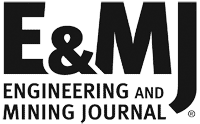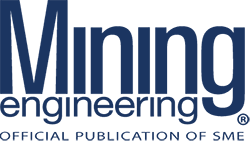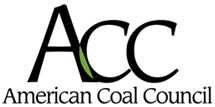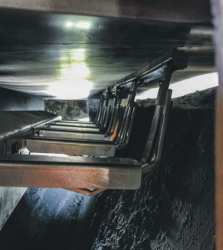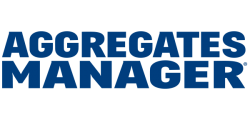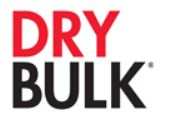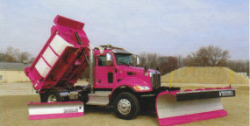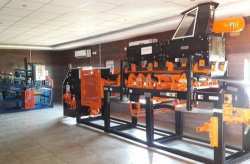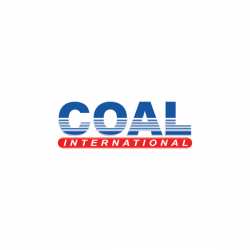Martin In The Press
Martin Engineering is very involved in the industries we serve and is often featured in their related publications. Some of those stories are compiled here.
The dangers of unsafe work practices around conveyors
Because of their size, speed and high-horsepower drive motors, conveyors pose a number of risks to personnel working on or near them. In addition to all of the physical danger zones, when an injury occurs ‘fault’ is often attributed to injured workers’ actions or inactions. However, safety experts point out that injuries generally occur due to a series of factors.
Read MoreN2 technology for remote monitoring of conveyor belt cleaners
Martin Engineering is excited about its new N2 technology to monitor conveyor belt cleaners. This will use remote monitoring to enable customers to look after their processing plants, ensuring safe inspection and servicing, making best use of time and resources, and ultimately maximizing uptime.
Read MoreTen common mistakes in conveyor specification and design
Conveyor systems are the lifeblood of a wide range of bulk material handling operations, including mining, coal and ore processing, aggregate and cement manufacturing. Modern systems are being tasked with moving greater volumes of cargo—at higher speeds—than ever before, yet the common practices in conveyor specification and design are out of date compared to the current expectations of users for safe, serviceable and reliable conveyance of bulk solids that minimize fugitive material. This article shows avoidable problems including recommendations for problem solving.
Read MoreSafe Confined Space Entry
When Working In Chutes, Silos, And Hoppers, Taking Special Precautions Can Save Your Life.
Read MoreMartin Engineering Debuts Automated Conveyor Belt Cleaner
Martin Engineering introduced an autonomous tensioning system that continuously monitors and delivers proper cleaner tension. By utilizing the company’s intuitive new smart technology platform to maintain proper blade-to-belt pressure, the N2 Twist Tensioner provides the best possible cleaning performance throughout the life of the blade. The system also alerts operators on the Martin Smart Device Manager App when the blade needs changing or if there is an abnormal condition. The result is efficient cleaning, increased safety, reduced labor, and a lower cost of operation.
Read MoreDesigning safer and more efficient biomass conveyors
Conveyors are among the most dynamic and potentially dangerous areas of equipment at a biomass processing plant. Even though their safety and performance are critical to the operation’s success, the impact of their contribution to overall efficiency is often not recognised by management and workers alike.
Read MoreAutomated conveyor belt cleaner tensioner reduces maintenance and guesswork
A global innovator of conveyor belt cleaning technology has introduced an autonomous tensioning system that continuously monitors and delivers proper cleaner tension. By utilizing Martin Engineering’s intuitive new smart technology platform to maintain proper blade-to-belt pressure, the N2® TwistTM Tensioner provides the best possible cleaning performance throughout the life of the blade. The system also alerts operators on the Martin Smart Device Manager App when the blade needs changing or if there is an abnormal condition. The result is efficient cleaning, increased safety, reduced labor and a lower cost of operation.
Read MoreSafe confined space entry for chutes, silos and hoppers
Clearing extensive build-up often involves confined space entry, but the consequences of untrained staff entering a chute, silo or hopper can be disastrous, including physical injury, burial or asphyxiation.
Read MoreOnline interactive conveyor training
The Foundations™ online seminars deliver non-commercial, topic-specific problem-solving information that can be put to immediate use. There’s no sales pitch, and even the most remote locations can take advantage.
Read MoreKeeping Track of Conveyor Belt Cleaners
Continuing its leadership in the development and implementation of advanced technologies for conveyors and other bulk material handling applications, Martin Engineering has announced a conveyor belt cleaner position indicator that monitors the blade, tracking and reporting remaining service life.
Read MoreDesigning for Safety: a new approach to belt conveyors
Conveyors are among the most dynamic and potentially dangerous areas of equipment at a mine or material processing site. Even though their safety and performance are critical to the operation’s success, the impact of their contribution to overall efficiency is often unrecognized by management and workers alike. Operational basics of belt conveyor systems are too often a mystery to those employees, who have little understanding about the hardware installed and the performance required from the components.
Read MoreTen common mistakes in conveyor specification and design
Conveyor systems are the lifeblood of a wide range of bulk material handling operations, including mining, coal and ore processing, aggregate and cement manufacturing. Modern systems are being tasked with moving greater volumes of cargo -at higher speeds- than ever before, yet the common practices in conveyor specification and design are out of date compared to the current expectations of users for safe, serviceable and reliable conveyance of bulk solids that minimizes fugitive material.
Read MoreBelt conveyor danger zones
In bulk material handling applications, a conveyor is typically a massive, complex, and extremely powerful system. It is usually constructed of rubber belting, set on rolling idlers, wrapped around large steel drums at each end, and driven by a high-torque motor. As such, a conveyor presents enough danger zones that the entire system should be considered a hazard.
Read MoreTen common mistakes in conveyor specification and design
Conveyor systems are the lifeblood of a wide range of bulk material handling operations, including mining, coal and ore processing, aggregate, and cement manufacturing. Modern systems are being tasked with moving greater volumes of cargo - at higher speeds - than ever before, yet the common practices in conveyor specification and design are out of date compared to the current expectations of users for the safe, serviceable, and reliable conveyance of bulk solids that minimizes fugitive material. This article shows avoidable problems including recommendations for problem-solving.
Read MoreKeeping on track with fertilizer cargoes
The Coffeyville Resources Nitrogen Fertilizer plant in Kansas has adopted innovative belt cleaning, alignment and modular chute technology to resolve tracking, spillage and dust problems on two conveyors transporting petroleum coke (petcoke). Before the upgrade, fugitive material required about 90 man-hours per week to safely clean and haul away. Martin Engineering redesigned the system with belt stabilization and chute sealing technology, sensitive belt tracking equipment and heavy-duty primary and secondary belt cleaners. Operators report considerably less carryback, no tracking issues and a significant reduction in fugitive dust and spillage. As a result, the only plant in North America to utilize petcoke gasification to produce hydrogen — a key ingredient in the manufacturing of ammonia and urea ammonium nitrate (UAN) fertilizers — estimates that the facility is saving more than US$14,000 per month in labour costs alone.
Read MoreAir cannon innovations in preheater towers
An essential part of the cement production process is the consistent flow of bulk materials, as poor material flow can put a stranglehold on a plant’s profitability, writes Brad Pronschinske, Director of Air Cannons Business Group/Martin Engineering. Air cannons have a long history of resolving material flow issues associated with bulk handling. Also known as air blasters, they are employed in a number of applications in cement production, from unclogging hoppers to moving super-heated material through the cooling process. Recent innovations in the engineering, installation, assembly and design of air cannons have been particularly effective in maintaining safe, efficient flow in preheater towers.
Read MorePreventing Accumulation Problems in Hoppers and Chutes
Air cannons can be useful in preventing troublesome material accumulation in process equipment, minimizing the need for downtime and manual labor.
Read MoreA Clean Sweep
Chris Schmelzer and Alan Highton, Martin Engineering, and R. Todd Swinderman, RToddS Engineering, explain why factory-direct managed servicing is the best solution for effective conveyor belt cleaning.
Read MoreDigital Transformation of Belt Cleaners Adds Productivity
Martin Engineering's solutions help reduce maintenance time for belt cleaners through remote monitoring and automatic blade tensioning.
Read MoreExternal Skirting Application to Mitigate Dust, Spillage and Downtime
Although skirtboard sealing systems have been around for decades and are standard for any efficient conveying system, that doesn’t necessarily mean the designs currently in use by most bulk handlers are well-engineered, function adequately and promote a safe working environment. Maintaining a safe workplace requires installing equipment that consistently keeps walkways clear from fugitive material, prevents dust emissions and allows maintenance to be performed safely without hazards such as confined space entry.
Read MoreSealed and Delivered: External Skirting Mitigates Dust, Spillage and Downtime
Although skirtboard sealing systems have been around for decades and are standard for any efficient conveying system, that doesn’t necessarily mean the designs currently in use by most bulk handlers are well-engineered, function adequately, and promote a safe working environment. Maintaining a safe workplace requires installing equipment that consistently keeps walkways clear from fugitive material, prevents dust emissions, and allows maintenance to be performed safely without hazards such as confined space entry.
Read MoreSpace Safety
Stringent advice has been issued in recent years, but accidents in enclosed spaces continue to occur. Martin Engineering gives guidance on safe confined space entry for silos and hoppers.
Read MoreConveyor danger zones
Recognizing the hazards is a key step toward preventing conveyor-related injuries, explains Daniel Marshall.
Read MorePreventing accumulation in mining hoppers and chutes
Air cannons can help prevent accumulation while minimizing the need for downtime and manual labor.
Read MoreFlow Dynamics: Preventing Accumulation in Hoppers and Chutes
Martin Engineering discusses how a high standard of material flow can be ensured in wet mining processes, reducing the risk of downtime at mine sites.
Read MoreMartin Engineering’s managed services for conveyor maintenance introduced to Mid-Atlantic region
The use of factory-trained, OSHA- and MSHA-certified experts for maintenance of bulk handling systems has taken another step forward as Martin Engineering establishes its newest Mr. Blade™ territory, serving the Mid-Atlantic region of the USA. Introduced in 2015, the network is a unique factory-direct service programme, delivering replacement belt cleaner blades, air cannon valves and other Martin products, specified and custom-fitted onsite and installed free of charge. Further, Martin service technicians will replace the main frame and tensioner of any belt cleaner as needed — also at no charge — as part of the Mr. Blade service relationship.
Read MoreBelt Conveyor Danger Zones
In bulk material handling applications, a conveyor is typically a massive, complex and extremely powerful system. It’s usually constructed of rubber belting, set on rolling idlers, wrapped around large steel drums at each end and driven by a high-torque motor. As such, a conveyor presents enough danger zones that the entire system should be considered a hazard.
Read MoreGo with the flow: Preventing accumulation in cement production
Efficient material flow is a critical element of cement manufacturing, as accumulation or blockages can reduce profitability. Hang-ups in storage systems and build-up in process vessels can impede material movement and cause bottlenecks that interfere with equipment performance and reduce process efficiency. Poor material flow also raises maintenance expenses, diverting manpower from core activities and in some cases introducing safety risks for personnel. There are a number of ways to avoid these pitfalls.
Read MoreBelt Conveyor Danger Zones
Recognizing Hazards Is A Key Step Toward Preventing Conveyor-Related Injuries. In bulk material-handling applications, conveyor systems present enough danger zones that the entire system should be considered a hazard. Rubber belting, rolling idlers, steel drums and high-torque motors all represent the possibility of injury.
Read MoreSmart Bulk Handling Breakthroughs
One of Martin Engineering’s latest innovations is its N2 Position Indicator, which the company describes as a “game-changer in the industry, with a positive impact on productivity, operating costs and safety.” The device, used to measure the wear of a conveyor belt cleaner blade, wirelessly provides information to a plant operator or service technician.
Read MoreMartin Engineering Debuts Automated Monitoring and Reporting System
Martin Engineering announced a belt cleaner position indicator that monitors blade, tracking and reporting remaining service life. The intuitive Martin N2 Position Indicator (PI) monitors primary belt cleaner blades, notifying Martin service technicians and plant operations personnel when re-tensioning or replacement is required and/or when abnormal conditions occur.
Read MoreStaying safe around belt conveyor danger zones
Recognising hazards is a key step toward preventing conveyor-related injuries. Dan Marshall, a Process Engineer for Martin Engineering, tells ABHR about some of the most common risks to avoid.
Read MoreBe Prepared
As part of moves to boost innovation in advanced technologies for conveyors and other bulk material handling applications, Martin Engineering has developed a belt cleaner position indicator that monitors the blade, tracking and reporting remaining service life. The intuitive Martin N2 Position Indicator (PI) monitors primary belt cleaner blades, notifying service technicians and plant operations personnel when re-tensioning or replacement is required and/or when abnormal conditions occur.
Read MoreEasy Railcar Opening
Martin Engineering has developed a new high-speed, high-torque railcar opener engineered to quickly open and close even the most stubborn gravity discharge gates.
Read MoreConveyor service contracts: reduce downtime and operating cost
Mining operators are increasingly turning to outside contractors to take advantage of consistent maintenance schedules and expert service. Conducted by experienced and well-trained technicians, these contracts have been found to improve safety and control costs.
Read MoreConsiderations to Make Around Conveyors
Martin Engineering’s N2 position indicator allows for the remote monitoring of belt cleaner blades via a mobile app that details the remaining blade life and notifies when a retensioning or replacement is required. The solution eliminates the need for technicians to do manual inspections, keeping them away from conveyor belts and reducing the chance of an incident occurring.
Read MoreDesigning for safety: a new approach to belt conveyors
Conveyors are among the most dynamic and potentially dangerous areas of equipment at a mine or material processing site. Even though their safety and performance are critical to the operation’s success, the impact of their contribution to overall efficiency is often unrecognized by management and workers alike. Operational basics of belt conveyor systems are too often a mystery to those employees, who have little understanding about the hardware installed and the performance required from the components.
Read MoreEngineer Safer Conveyors
All new conveyor systems inevitably succumb to the punishing bulk-handling environment and slowly degrade. Eventually, a system will require more time and labor for maintenance, deliver shorter periods of operation and longer periods of downtime, and become an ever-increasing cost of operation. This period is accompanied by an increased safety risk. To reduce hazards involves a variety of methods, from use of personal protective equipment (PPE) to installing the latest and safest equipment designs. Improving effciency and reducing risk can be achieved by using a hierarchy of control methods. The consensus among safety professionals is that the most effective way to mitigate risks is to design the hazard out of the component or system.
Read MoreSafe confined space entry for chutes, silos and hoppers
Many factors can cause bulk materials to adhere to the sides of chutes, silos and hoppers - including humidity, moisture content, size/texture of the raw material or increased production volume - resulting in lost capacity or clogging. Ongoing accumulation reduces flow and eventually stops production in order to address the issue, causing expensive downtime and requiring extra labor to clear the obstruction.
Read MoreGlobal Gypsum: Controlling Conveyor Carryback
Carryback is defined as the material that fails to unload from a conveyor belt, adhering to the belt and typically falling off at some point other than at the intended discharge. The effectiveness of mechanically scraping carryback from a conveyor belt is important in the gypsum industry because the consequences of not cleaning the belt are significant...
Read MoreReduce Conveyor Maintenance Time Through Better Access
Virtually every vehicle on the road today is designed with a hood that can be easily opened for access to the engine, so mechanics can perform routine service and diagnose I address problems that arise during its lifespan. Conveyor systems should be designed in much the same way, with convenient points along the length of the belt to allow technicians to inspect its condition, perform service as needed and help prevent catastrophic failure.
Read MoreRoom To Manoeuvre
Confined spaces continue to present challenges for bulk terminal operators and shipowners alike, but training and technology can cut the casualties.
Read MoreDry Cargo International: Reduce Conveyor Maintenance Time
Conveyor manufacturers have responded to the need for increased accessibility to system components by developing components and accessories specially designed to reduce labor time, while improving safety during service.
Read MoreGöltas Cemento opts for modernised belt apron conveying
Leading quarry conveyor and associated kit manufacturers are finding their products in big demand globally.
Read MoreDry Cargo International: New Conveyor Belt Cleaner Design
A new conveyor belt cleaner has been designed with an innovative method of holding the urethane blade in place without the need to mill any slots for holding pins.
Read MoreControlling Conveyor Belt Carryback
Virtually every technique and combination imaginable has been tried for cleaning conveyor belts handling bulk solids, including piano wires, high-pressure water spays, brushes, vibration, and even very small head pulleys to fling carryback from the belt.
Read MoreReducing Conveyor Maintenance Time Through Better Access
Conveyor systems should be designed with convenient points along the length of the belt to allow technicians to inspect its condition, perform service as needed and help prevent catastrophic failure. Unfortunately, this type of access is often overlooked when engineering conveyor systems until a pressing need arises, which increases the difficulty of ongoing inspection that could have allowed technicians to observe and service critical components before a crisis develops.
Read MoreSafety Is Key
Daniel Marshall, Martin Engineering, USA, discusses unsafe work practices around conveyor belts.
Read MoreNew Belt Cleaner Design Reduces Inventory For Producers
A new conveyor belt cleaner is designed with a method of holding the urethane blade in place without the need to mill any slots for holding pins. Combining the benefits of previous designs into one product, the QC1+ belt cleaner from MARTIN ENGINEERING can be cut to length to fit virtually any application, reducing the need for customers to stock multiple blade sizes to accommodate different belt widths.
Read MoreReduce Maintenance By Improving Access
Conveyor systems should have access points along the belt that allow for better inspections and produce more efficient, safer maintenance.
Read MoreTaking Control
Working closely with Martin Engineering Brazil, T-Grão Cargo – located at Latin America’s busiest port, Santos in São Paulo, Brazil – saw its dust control efforts improve exponentially.
Read MoreKeep Moving: A Case Study
Efficient material movement via conveyor is critical for efficient cement throughput — a particularly acute issue when running wet raw material at the quarry. At Ash Grove Cement’s facility in Louisville, Nebraska, operations personnel noted accumulation in specific locations that threatened to slow material movement — particularly at transfer points — which required manual intervention on a near-constant basis.
Read MoreInnovative design for efficiency
Conveyor systems should be designed with convenient points along the length of the belt that allow technicians to inspect its condition, perform service as needed and help prevent catastrophic failure. Conveyor manufacturers have responded to the need for increased accessibility to system components by developing components and accessories specially designed to reduce labor time while improving safety during service.
Read MoreReduce Conveyor Maintenance Time Through Better Access
Improved conveyor access can significantly reduce maintenance time and prevent injuries.
Read MoreSet In Stone
Conveyor systems are a key component of cement handling and there are a number of solutions available that aim not only to reduce wastage, but also to ensure that product can be handled as cleanly as possible. Martin Engineering’s CleanScrape Secondary Cleaner has been engineered specifically for challenging applications where traditional designs fail to deliver the necessary performance or wear life. The CS2 is particularly effective in conditions where continuous production is a high priority or cleaner service is difficult, including corrosive or high-temperature environments.
Read MoreInnovative Stainless Steel Conveyor Belt Cleaner
A new secondary conveyor belt cleaner has been engineered specifically for challenging applications where traditional designs fail to deliver the necessary performance or wear life. The CleanScrape® Secondary Cleaner (CS2) from Martin Engineering is particularly effective in conditions where continuous production is a high priority or cleaner service is difficult, including corrosive or high-temperature environments. Typically requiring just one re-tensioning during its lifespan, the extremely low maintenance requirements and outstanding cleaning ability help reduce cost of ownership in a wide range of industries, such as mining, coal processing, quarrying, cement production, scrap and other bulk material handling operations.
Read MoreReduce Conveyor Maintenance Time Through Better Access
Conveyor systems should be designed with convenient points along the length of the belt to allow technicians to inspect its condition, perform service as needed and help prevent catastrophic failure. Unfortunately, this type of access is often overlooked when engineering conveyor systems until a pressing need arises, which increases the difficulty of ongoing inspection that could have allowed technicians to observe and service critical components before a crisis develops. As a result, costs go up and productivity goes down.
Read MoreImproved Access Reduces Conveyor Maintenance Time
Conveyor systems should be designed with convenient points along the length of the belt to allow technicians to inspect its condition, perform service as needed and help prevent catastrophic failure.
Read MoreReduce Conveyor Maintenance Time Through Better Access
Virtually every vehicle on the road today is designed with a hood that can be easily opened for access to the engine, so mechanics can perform routine service and diagnose / address problems that arise during its lifespan. Conveyor systems should be designed in much the same way, with convenient points along the length of the belt to allow technicians to inspect its condition, perform service as needed and help prevent catastrophic failure.
Read MoreInnovative Stainless Steel Conveyor Belt Cleaner
A new secondary conveyor belt cleaner has been engineered specifically for challenging applications where traditional designs fail to deliver the necessary performance or wear life. The CleanScrape® Secondary Cleaner (CS2) from Martin Engineering is particularly effective in conditions where continuous production is a high primary or cleaner service is difficult, including corrosive or high-temperature environments. Typically requiring just one re-tensioning during its lifespan, the extremely low maintenance requirements and outstanding cleaning ability help reduce cost of ownership in a wide range of industries, such as mining, coal processing, quarrying, cement production, scrap and other bulk material handling operations.
Read MoreThe Contractor Factor
Daniel Marshall, Martin Engineering, discusses the benefits of maintenance service contracts.
Read MoreBudge the sludge: Mine uses air cannons to unclog chutes
Eagle Mine in Western Marquette County of Michigan’s Upper Peninsula is the only primary nickel mine in the United States, delivering ~1.5% of the world’s total nickel production. Material accumulation was causing problems in an undersized chute in the handling process. Buildup began at the hopper and at the discharge slope, but could also occur at virtually any point, blocking the chute.
Read MoreReduced ownership cost
A new secondary conveyor belt cleaner has been engineered specifically for challenging applications where traditional designs fail to deliver the necessary performance or wear life.
Read MoreWhen the dust never settles
A common refrain regarding dust management at conveyor transfer points goes something like this: “That’s just the way it is. There’s always been dust. And the control system has never worked properly,” writes Reiner Fertig, Business Development Manager for Conveyor Products, Martin Engineering GmbH. In fact, the causes of dust generation are complex: volumes, particle sizes and behaviour of the emitted dust depend on many factors. Accurate dust measurements are difficult and often costly, as the emissions are diffuse, so it may be impossible to draw any direct conclusions regarding individual emission sources. Plant operators often rely on a visual impression to decide where the dust problem lies. The tendency is then to try out different things and see what effect they have.
Read MoreHigh-performance cleaner keeps stockyard conveyors in tip-top condition
A new secondary conveyor belt cleaner has been engineered specifically for challenging applications where traditional designs fail to deliver the necessary performance or wear life. The CleanScrape® Secondary Cleaner (CS2) from Martin Engineering is particularly effective in conditions where continuous production is a high priority or cleaner service is difficult, including corrosive or high-temperature environments. Typically requiring just one re-tensioning during its lifespan, the extremely low maintenance requirements and outstanding cleaning ability help reduce cost of ownership in a wide range of industries, such as mining, coal processing, quarrying, cement production, scrap and other bulk material handling operations.
Read MoreNew technology generates power using conveyor belt kinetic energy
The Martin® Roll Generator is designed to create a self-contained mini power station that allows operators to run electrical monitoring systems and safety mechanisms. Able to be retrofitted on existing idler support structures, the new design is a step toward eliminating power production obstacles as conveyors move into the next generation of “smart systems” that are more autonomous and sustainable.
Read MoreContainment Systems Can Curtail Conveyor Problems
Most conveyor-related injuries occur though routine maintenance or cleanup of spillage and dust, particularly around transfer points and chutes. Controlling fugitive material in these areas should be one of the primary elements in any program aimed at reducing hazards and preventing injuries.
Read MoreAggregates Business - Conveying Long Term Value
Conveyors are vital equipment in a quarry, transporting vast volumes of different sized crushed and screened aggregates products to stockpiles for further processing. Liam McLoughlin & Guy Woodford look at some of the latest developments in this area.
Read MoreRock Road Recycle - Cement Manufacturer takes control of fugitive material
The entire upgrade operation was completed in just 11 days during the scheduled outage, with crews working 12-hour days to accommodate the planned shutdown. While specific cost savings are difficult to quantify, the maintenance manager said the difference is easily observed. “The production team responsible for that area has had nothing but positive feedback about the upgrades,” he commented. “We’re not losing product to spillage and dust so that material can be sold instead of cleaned up off the floor. The manpower formerly spent on cleanup can now be directed to core business activities.
Read MoreInnovative Stainless Steel Conveyor Belt Cleaner
Innovative stainless steel conveyor belt cleaner: high performance + long life = reduced ownership cost
Read MoreAT Mineral Processing - Optimized Tension
Maximizing performance and life of belt cleaners.
Read MoreMining People - Innovative Stainless Steel Conveyor Belt Cleaner
A new secondary conveyor belt cleaner has been designed to combat carryback in extremely challenging applications where traditional cleaning methods do not meet performance or wear life expectations.
Read MoreWorld Coal - Access All Areas
How increasing conveyor access improves safety and reduces maintenance costs.
Read MoreAggregates Manager - Improve Conveyor Housekeeping
A well-designed transfer point contains material for cleaner, safer, and more productive conveying.
Read MorePit & Quarry - Conveyor transfer point design considerations: Advice for cleaner, safer and more productive conveying
In a properly engineered transfer point, each component—from the chute design to the cradles and dust seals—is employed to maximize its specific function and contain dust and fines, while at the same time offering workers easy access for maintenance.
Read MoreDry Cargo International - Maintenance Service Contracts: Optimizing Conveyor Uptime and Reducing costs
Technological advancements in bulk handling equipment over the last few decades have increased throughput and reduced downtime, while limiting worker exposure to hazards. However, at some point the system always requires a real person to assess issues, make decisions and implement proper solutions.
Read MoreDry Cargo International - Sealed and Delivered: External Skirting Mitigates Dust, Spillage and Downtime
Although skirtboard sealing systems have been around for decades and are standard for any efficient conveying system, that doesn’t necessarily mean the designs currently in use by most bulk handlers are well engineered, function adequately and promote a safe working environment.
Read MoreAT Mineral Processing Worldwide - Optimized tension: Maximizing performance and life of belt cleaners
Seemingly mundane tasks such as adjusting belt cleaners and removing spillage often require employees to work in close proximity to the moving conveyor, where even incidental contact can result in serious injury in a split second.
Read MoreAT Mineral Processing Europe - Optimized tension: Maximizing performance and life of belt cleaners
Seemingly mundane tasks such as adjusting belt cleaners and removing spillage often require employees to work in close proximity to the moving conveyor, where even incidental contact can result in serious injury in a split second.
Read MoreWorld Cement - Cannon Control
A moving conveyor belt can generate power for air cannons to control accumulation.
Read MoreRock Road Recycle - Conveyor transfer point design: Material containment for safety & efficiency
Controlling fugitive material is becoming one of the primary elements in a well-organized effort to reduce hazards and prevent injuries.
Read MoreRock Road Recycle - Missouri composter blankets dust with atomized misting equipment
An innovative Midwest composting company has specified high-performance dust suppression equipment for a busy yard waste transfer station, helping the firm comply with environmental regulations and maintain good relationships with its commercial neighbors.
Read MoreDry Cargo International - Conveyor transfer point design: Material containment for safety & efficiency
Conveyor operators need only take a broad look at the expense that fugitive material has on a system to realize the full cost that accompanies inefficient transfer point designs.
Read MoreRock Road Recycle - Trucking company shakes off low-quality truck vibrators
Missouri composter uses atomized misting equipment for dust suppression at a busy yard waste transfer station.
Read MoreDry Cargo International - Keep the flow going: preventing accumulation in cement processing
Efficient material flow is a critical element of dry-process cement manufacturing, and accumulation or blockages can put a choke hold on a plant’s profitability,
Read MoreInternational Mining Engineer - Optimise To Maximise
The ability to maintain the proper force required to keep the blade edge against the belt is a key factor in the performance of any cleaning system. Blade-to-belt pressure must be controlled to achieve optimal cleaning with a minimal rate of blade wear.
Read MoreDry Bulk - Conveyors of the Future
Key factors to consider when designing new conveying systems to transport bulk materials safely and cost-effectively
Read MoreRock Products - Truck Vibrator a Benefit for Herman's Trucking
Material buildup on the walls, floor, and tailgate of the truck bed can reduce the capacity of each load, extending unloading time and reducing efficiency.
Read MoreInternational Bulk Journal - Vibrators Go Pink
The Cougar Cares program raises awareness and the importance of early detection of breast cancer. Just like last year, we're proud to be joined by our friends at Bonnell Industries, who have built an entirely pink truck equipped with a pink truck vibrator.
Read MoreRock Road Recycle - Bulk Handling Equipment Manufacturer Expands Operations
A world leader in bulk material handling solutions has expanded its UK and Scandinavian operations, allowing it to offer wider service, faster equipment delivery and extensive employee training to customers. Martin Engineering’s new facility located near Mansfield, Nottinghamshire (UK) includes a new office, training center, production area and warehouse. With its expanded team of knowledgeable industry professionals, the company will partner with UK and Scandinavian customers to offer solutions to common material handling problems, while at the same time improving the work environment with safer equipment and detailed training seminars. The result is a highly responsive unit committed to improving efficiency and compliance, while minimizing customer operating costs.
Read MoreWorld Coal - Fighting Fire
Improving the fire retardance of its belting is just one of the ways that an operation can reduce the risk of conveyor fires. The development of fire-retru·dant conveyor belting has made an important contribution to safety, but even fire-retardant belts can burn in the presence of another fuel. These potential fire hazrds can only be minimized through high standards of conveyor installation, maintenance and cleanliness.
Read MoreAmerican Coal - A Career Profile: Life in a Coal Family
"I could always tell when my dad had worked in the coke battery that day, because it gives off a unique smell,'' O'Harran reflected. "We'd sit at the dinner table, and my dad would say, 'This meal is brought to you by coal.' That always stuck with me."
Read MorePlant Expansion Includes Training Facility With Life-Sized Conveyor Models
Having provided advanced training at Tata’s Jamshedpur facility in 2015, the steel producer partnered with Martin Engineering to deliver a complete course, from basic conveyor components and operation to advanced engineering concepts. With a curriculum that covers potential risks, operational skills and best practices, the trainers emphasized the Martin Engineering core principal of “Production Done Safely.”
Read MoreRock Road Recycle - Wear resistant metal alloy extends equipment life
Martin® Arcoplate™ combines a smooth and dense chromium carbide-rich metal alloy face plate with a hard steel back plate to resist gouging, erosion, temperature extremes and material buildup. Installing it on surfaces exposed to abrasive conditions increases protection for longer equipment life with less frequent maintenance
Read MoreDry Cargo International - Cement plant solves conveyor issues using power generation technology
"It's designed to be a self-contained mini power station that's retrofitted onto existing idler support structures, so the generator can be employed on virtually any steel roller," said Andrew Timmerman, Product Development Engineer at Martin Engineering. "As conveyors move toward more sustainable and autonomous 'smart systems,' the Roll Gen eliminates the power accessibility obstacles to employing sensors, cleaners and dust control systems such as we installed for Illinois Cement."
Read MoreMining People - Martin Engineering program raises funds for breast cancer awareness
"Our company has always felt a connection to this cause," observed Martin Engineering Chairman Ed Peterson. "Like our family, the Goodmans have roots in the Peoria area. Susan grew up there and returned after getting her degree to marry her college sweetheart, Stan Komen."
Read MoreDry Cargo International - Keeping limestone mine stockpiles dust-free
“The Martin team has gone above and beyond to make sure everything is operational and efficient,” Rosenkrans concluded. “We are currently considering a service contract for the new dust system, and potentially including the company’s onsite blade replacement service as well. From our first encounter, we’ve had a positive experience throughout the entire process and we’re very satisfied with the result.”
Read MoreInternational Mining - Driving down dust
''After inspection, we devised a plan that optimized the dust control at both locations, while using as much common equipment as possible," explains Brian Nance, product engineer at Martin Engineering. "Our DCU is designed to independently control dust at several application points, thus allowing for the use of much of the same technology, while employing a different strategy for each of the two emission areas."
Read MoreMiners News - Conveyor technology helps Gold Rush team compete
For the wet conveyor, the Martin technicians selected a heavy-duty primary belt cleaner that features unique technology to maintain the most efficient cleaning angle throughout its service life. Equally important given the time constraints of the competition, the blade features a no-tool replacement process that can be performed safely by one person in less than five minutes.
Read MoreAustralasian Mine Safety Journal - The economics of workplace safety
Martin Engineering’s recently published book FOUNDATIONS™ for Conveyor Safety provides a road map for justifying investments in safety. When specific data isn’t available, the book provides numerous references and global averages for conveyor safety that can be used to reasonably estimate the benefits of investments in safety
Read MoreAustralasian Mine Safety Journal - Safe-to-service cleaners reduce risk and service time
Martin Engineering developed the Safe to Service (STS) blades to secure both primary and secondary cleaners rigidly to the conveyor mainframe, while offering more versatility and easier access.
Read MoreMining & Quarry World - Conveyor technology helps gold rush team compete
That’s when a chance meeting at a trade show gave Poulson the opportunity to meet representatives from Martin Engineering, one of the innovators and premier suppliers of components to make bulk material handling cleaner, safer and more productive
Read MoreAT Mineral Processing - Controlling fugitive dust at limestone conveyor transfer
After finding that an estimated 10–20% of the material load was spilling along the belt path, Singleton Birch implemented a control strategy from Martin Engineering that included a rebuilt transfer point as the material takes a 20-foot drop from one belt to another. Courtesy of www.at-minerals.com
Read MoreRock Road Recycle
“Belt cleaning was one of our biggest obstacles at the time,” he recalled. “We were wasting both material and labor, and we couldn’t afford to give that advantage to the competition.”
Read MoreRock Products - Keeping up the pressure
The ability to maintain the proper force required to keep the blade edge against the belt is a key factor in the performance of any cleaning system. Blade-to-belt pressure must be controlled to achieve optimal cleaning with a minimal rate of blade wear.
Read MoreCement Americas - Cleaner with air
“After five years of constant operation, the results have been better than we ever expected,” said Schutt. “Since the installation, we have had a significant reduction in downtime due to accumulation.”
Read MoreDust Control Strategy for Continental Cement Prevents Fugitive Dust Emissions
“The two main areas we identified as having unacceptable dust emissions were at the underground crusher hopper and outdoors where the material was discharged onto the stockpile,” Rosenkrans explained. “With the mine having a single exhaust point, we didn’t want the dust from trucks offloading into the hopper to travel through the mine shaft, lowering visibility and reducing air quality.
Read MoreConcrete Plant International: Compact Precast Concrete Vibrator
Martin Engineering has introduced a heavy-duty compact electric vibrator that provides high performance on the inside and outside of small diameter precast concrete pipe form cores. The Martin MB36-3000 Concrete Form Vibrator offers very good compaction of the cast for improved material strength. The rugged design has a high force-to-weight ratio and ensures reliability using high heat-rated internal components, allowing the unit to perform consistently under punishing conditions for extended periods.
Read MoreHUB-4 - Controlling dust emissions on limestone conveyor transfer point
When accompanied by the Double Sided ApronSeal™ skirting and clamps, the system forms a tight belt seal, delivering outstanding fugitive material control.
Read MoreThe Economics of Workplace Safety
It is not a question of ‘if’, it is a question of ‘when’ a business will experience a serious workplace accident or enterprise-wide disaster. There are many things that can be done to extend the ‘when’, even to the point of making ‘when’ an almost statistical impossibility. Using conveyor design as an example, this article provides a useful methodology – which can be applied to any aspect of safety – for justifying investments to reduce the probability and severity of accidents.
Read MoreRock Products: Underground Dust Control
“The two main areas we identified as having unacceptable dust emissions were at the underground crusher hopper and outdoors where the material was discharged onto the stockpile,” Rosenkrans explained. “With the mine having a single exhaust point, we didn’t want the dust from trucks offloading into the hopper to travel through the mine shaft, lowering visibility and reducing air quality.
Read MoreWorld Coal - A welcome transition
A new, patented concept has been developed to execute an effective trough transition in a short distance. This new approachis based on a two-stage transition, with the first going from tail pulley to 20° and then the full loading zone gradually transitioning from 20° to the full trough angle at the exit.
Read MoreMining People - High-efficiency vibrators for spreaders, pumpers & volumetric mixer trucks
Able to be retrofitted to most standard brackets, the high-efficiency design uses less currents and runs at a lower temperature, while retaining the same power as comparable models. The results is longer equipment life with lower operating expense and maintenance costs by reducing material buildup, slow unloading, clogging and bridging.
Read MoreDry Cargo International - Conveyor systems tracking technology
Currently being implemented in select markets around the world, the new tracking program captures a wide array of information to create a detailed record on all components. Courtesy of www.dc-int.com
Read MoreDry Cargo International - Repositioning clinker cooler air cannons
“Our cannons were located close to cooler walls where the ambient conditions were very hot and dusty, making it difficult to keep the equipment functioning reliably,” said Mike Schutt, Production Manager for Lehigh Hanson. “Our new air cannon arrangement has been a great success, and I have no doubt it could be effectively applied to many cement kiln operations around the world.” Courtesy of www.dc-int.com
Read MoreAT Mineral Processing: Conveyor Belt Tracker With Continuous, Precise Adjustment
Able to effectively center the belt regardless of the travel direction, the robust unit has demonstrated greater durability and longer service life than previous designs, translating to a reduced cost of ownership.
Read MoreAT Mineral Processing - Innovative conveyor belt cleaner program
“This first UK van will be targeting the Midlands Area including Leicestershire, Nottinghamshire, Derbyshire and South Yorkshire, where there’s a high concentration of aggregate producers, cement plants and other users of belt cleaners. With this type of system, we’re in a position to be able to deliver proactive service in advance of a breakdown, replacing worn or failing components before they lead to an event that stops production.” Courtesy of www.at-minerals.com
Read MoreMining Engineering - Improving conveyor transfer point performance
To complete the containment system, technicians also installed an integrated air cleaner, which contains a suction blower, filtering elements and a filter-cleaning system.
Read MoreInternational Mining - Containment strategy
"We've gone from an everyday battle with this conveyor to almost no clean-up at all," says a delighted Maita. "Now we have a guy down there with a broom every few days. That's it."
Read MoreSolids & Bulk Handling - CleanScrape makes a difference
After a full year of punishing 24/7 operation with little downtime through conditions that included cold slush and mud, as well as hot and dry dusty material, the original CleanScrape cleaner continues to perform consistently well, without a single adjustment
Read MoreAT Mineral Processing - High force transmission by low weight
With one of the highest force to weight ratios available in the marketplace, the Martin® IMP3 Impacting RailcarVibrator delivers the power required to evacuate compacted bulk materials such as fertilizers, bentonite clay, Portland cement, grain and other agricultural products.
Read MoreZKG International - Controlling dust emissions on limestone conveyor transfer point
"When we turned the system on with a full volume of material being loaded onto the belt, there was some confusion at first from the person over the intercom as to whether the system was operating, since there appeared to be no dust," Kevill recalled. "Even after nearly a year of operation, the air inside of the enclosure is clear enough to see down the entire length of the shaft."
Read MoreAustralian Mining - Conveyor belt tracker delivers precise results
A new powered conveyor belt tracker from Martin Engineering delivers immediate and continuous precision adjustment of hard-to-track reversing conveyors, helping operators reduce spillage and extend the life of belts and other system components.
Read MoreProcessing - Dust management for conveying powdered materials
Because of the varying types and diversity of dust control methods, powder and fine material handlers should consider evaluating causes, problem areas, dust-generating processes and potential cargo management techniques to arrive at the optimum approach for their operation.
Read MoreCoal Age - Optimizing Belt Cleaner Tension Maximize Performance & Service Life
The bottom line is that properly installed and adjusted belt cleaners help minimize carryback and spillage, reducing risk and overall operating costs.
Read MoreAT Mineral Processing - Conveyor belt tracker with precise adjustment
For locations where no electricity or plant air is available, Martin Engineering designed the Roll Generator to serve as a self-contained mini power station. In those cases, the tracker uses an electric actuator to move the rolls and correct the belt's position.
Read MoreFugitive Material Management - Quarries and Mines Article
The loading and discharge points of conveyor belts are common locations for spillage problems to occur. Engineered transfer chutes can accomplish efficient transfers without blockages, while greatly minimizing dust generation.
Read MoreA Breath of Fresh Air - World Cement Article
"After five years of constant operation, the results have been better than we ever expected," said Schutt. "Since installation, we have had a significant reduction in downtime due to snowman formation . Not having to get near the hot wall or put on special equipment has definitely made a difference in the morale of the maintenance and production staff."
Read MoreDoing Away With Dust - Rock Products Article
“Plant safety is one of our chief concerns,” said Chris Smith, lime maintenance leader at Singleton Birch. “We strive to balance productivity with a good working environment, and addressing dust emissions is a high priority.”
Read MoreZKG International - Innovative technology eliminates carryback
Designed for belt speeds up to 780 fpm (4 m/s) for mechanically spliced belts, pulley diameters up to 50 inches (1270 mm), and belt widths up to 96 inches (2438 mm), the CleanScrape is engineered to perform under the punishing conditions of the cement and bulk handling industries.
Read MoreKeep Material Flowing - Solids & Bulk Handling Article
A state-of-the-art cement plant has resolved material accumulation issues in its limestone silo by combining high-efficiency cleaning techniques with powerful, strategically-placed air cannons to prevent further build-up.
Read MoreAT Mineral Processing - Safe-to-Service Belt Cleaners Reduce Risk and Service Team
Martin Engineering developed the Safe to Service (STS) blades to secure both primary and secondary cleaners rigidly to the conveyor mainframe, while offering more versatility and easier access
Read MoreSafety is a Primary Consideration - Coal Age Article
“Routine maintenance and replacement of blades that require reach-in or chute entry is an unpleasant and potentially dangerous task for workers,” said Daniel Marshall, product engineer for Martin Engineering. “We developed the STS system so operators could work on the product safely from outside the chute wall, without breaking the plane of entry.”
Read MoreControl Damage and Spillage at Conveyor Drop Points - ZKG International Article
One of the largest cement producers in the state of Texas/USA has eliminated a source of fugitive material and equipment damage.
Read MoreConveyor Belt Tracker Technology Improves Performance and Service Life - ZKG International Article
A standout trait is the easy installation and maintenance of the unit, secured by two specially designed low-footprint brackets taking up only 50 mm on either side of the mainframe.
Read MoreClearing a Blockage - International Bulk Journal Article
A state-of-the-art cement plant has resolved material accumulation issues in its limestone silo by combining high-efficiency cleaning techniques with powerful, strategically placed air cannons to prevent further buildup.
Read MorePatented belt cleaner reduces total ownership cost - ZKG International Article
It delivers outstanding performance and durability, while reducing the total cost of ownership.
Read MoreCoal Age - Conveyor Cleaners
Martin Engineering has introduced a new family of heavy-duty conveyor belt cleaner designs, engineered so the blade cartridge can be pulled away from the belt for safe access and replaced by a single miner.
Read MoreAddress Dust at Point of Emission - Solids & Bulk Handling Article
Dust would quickly build up around the loading zone and encapsulate the tail pulley, eventually causing the belt to just slide over the built-up material rather than riding on the rollers.
Read MoreResolving Material Accumulation in Cement Plant Limestone Silo - Dry Cargo International Article
The new weather situation caused the silo to clog every week. This required workers to spend up to 12 hours to clean it out using compressed air and other tools. As the winter got worse, so did the clogging problem.
Read MoreDesigning for Safety - International Mining Article
Conveyors are among the most dynamic and potentially dangerous areas of equipment at a mine or a materials processing site. Even though their safety and performance are critical to the operation's success, the impact of their contribution to overall efficiency is often unrecognized by management and workers alike.
Read MoreDelivering Results - World Fertilizer
The spillage was significant;' Gilbertson explained. "We were seeing waist-deep piles accumulating each day, which required an average of about 90 man-hours per week to safely clean the affected areas and haul the material away."
Read MoreBulk Handling Today - A seismic shift in belt cleaning
In response to these issues, Martin Engineering has custom-engineered a modular polyurethane moulding cell specifically designed to generate the highest quality belt cleaner blades in the world.
Read MoreConveyor Drop Points - Bulk Solids Handling
If hundreds of rocks are dropped onto an unprotected conveyor belt every few seconds, an operator can expect an inevitable outcome: fugitive material, persistent breakdowns and costly repairs of the belt, idlers and pulleys.
Read MoreKeep the Dust - Bulk Solids Handling
Dust is a nuisance in almost any bulk solids handling application, as it is harmful/ for the health of employees and neighboring as well as for the environment. Therefore, binding or capturing of dust is of paramount importance.
Read MoreEliminating the Risk - Coal International
The fatal accident rate among miners has dropped from a peak of more than 25 deaths per 10,000 workers in the early 1940s to less than five currently. If the rate is plotted graphically, we can see that there have been two significant drops – one in the mid- 1940s and another in the mid-70s. But the graph also illustrates that while the overall number has continued to decline slightly in the last 30 years, the rate of improvement has slowed drastically.
Read MoreDown The Rathole - World Cement Article
Although technology for industrial concrete production has made great strides, the hopper's basic funnel design still tends to accumulate buildup in cement manufacturing operations, which can eventually lead to clogging and process downtime. This was the problem CRH Roadstone Limited, a cement and concrete block production firm, was experiencing.
Read MoreAvoiding Accumulation - World Cement Article
Drake Cement is one of the newest cement companies in America's southwest, with operations beginning in 2011. Located at the site of an old rail town, the facility includes a state-of-the-art, six-stage in-line calciner with a rated capacity of 660,000 tpa of clinker. Some of their operating and pollution controls are so advanced that they are found in only a few other facilities throughout the world.
Read MoreDust and Air: The Facts - World Coal Article
Dust has been an issue of concern and research ever since bulk solids were first transported by conveyor belt. Airborne dust travels in the air currents created by the handling of bulk solids. Extensive research has been conducted to determine the quantity of air created at a transfer point, resulting in three different methodologies to predict the amount of air generated.
Read MoreSeptuagenarian Success - World Coal Article
Martin Engineering has come a long way in its 70 years of business. From its origins in rural Illinois, the company now offers its bulk material handling solutions around the world. But despite this long history, the company remains clear about where it came from - and that story still drives its vision today. So where did it all begin?
Read MoreMaintaining The Standard - World Coal Article
Few would argue with the assertion that even one serious conveyor accident can cost more money than virtually any safety programme. Employees in conveyor-related industries also deserve to have the safest workplace that is reasonably possible. Yet as downsizing trends advance and the economy stagnates, there is temptation to postpone maintenance and safety upgrades.
Read MoreInvestigating Carryback - World Coal Article
Ineffective conveyor belt cleaning can result in carryback (material that clings to the return side of the belt after the cargo has been discharged), leading to the accumulation of dust and spillage along the length of the conveyor structure. This accumulation interferes with plant operations and exposes personnel to unnecessary safety risks when cleaning up the material.
Read MoreHurricane Season - ZKG Article
A cement plant located in the West of Istanbul, Turkey, and has a production capacity of 5,900 tons of clinker per day. It’s one of the largest producers in Turkey’s busy cement industry, supplying 10% of the country’s total demand and 12.5% of the nation’s total cement and clinker exports. Originally built in 1967, the facility has three clinker production kilns.
Read MoreMaking the Right Choice - World Coal Article
A central dust collector consists of a single assembly containing all fans, filters, and a collection hopper. As the name implies, this assembly is located at a central point and connected to all the individual collection points by means of sealed ductwork. This type of filtration system would handle all the dust extracted from the entire conveyor system.
Read MoreTime For An Upgrade - World Coal Article
The Omaha Public Power District (OPPD) is one of the largest publicly owned electric utilities in the US. As part of OPPD's commitment to best practices for environmental stewardship, the North Omaha power plant was converted to burn cleaner, lower-sulfur coal from the Power River Basin (PRB). In switching to the cleaner fuel, the plant faced some challenges.
Read MoreReducing the Cost of Dust Collection - Cement International Article
Fugitive material has been an issue in bulk material handling for as long as conveyors have been in use. Dust and spillage create a variety of potential hazards and waste valuable resources. Consequences of regulatory violations can range from simple warnings to massive fines. A proactive approach is to eliminate the root cause, typically through the use of dust collectors to gather and filter dust-laden air.
Read MoreCarrying the Bulk Load - Dry Cargo International Article
Few would argue with the assertion that a single serious conveyor accident can cost more than virtually any safety programme. Most people would also agree that employees in conveyor-relayed industries deserve to have the safest workplace that is reasonably possible. Yet there is a temptation to postpone maintenance activities and safety upgrades in an effort to preserve profitability.
Read MoreA Need for Speed - World Coal Article
As coal mining and processing operations continue the ongoing search for ways to increase production volumes, one area of focus has been the conveyor systems that carry massive amounts of bulk material over long distances at high speeds. One sign of this is the increasing use of wider conveyors that are able to handle larger loads.
Read MoreSolving Flow Problems - Bulk Handling Today Article
The efficiency of any bulk material handling process depends on consistent material flow throughout the system. Any build-up of material in chutes, hoppers, silos, and loading staiths cause a bottleneck-effect, eventually halting the flow completely, bringing the entire system to a complete standstill as manual clearing takes place.
Read MoreHandling PRB Coal - Power Engineering Article
In the 1980s, OPPD was converted to burn cleaner, lower sulfur coal from Wyoming’s Powder River Basin (PRB), as part of their commitment to best environmental stewardship practices. The North Omaha Power Station, a 646 MW coal fired power plant located on the Missouri River north of the city, was constructed over 50 years ago and was originally constructed to burn high sulfur coal.
Read MoreNew Tricks For The Old Dogs - Power Engineering Article
The efficient handling of coal on belt conveyors is essential to coal-fired power plants. The conveying of coal is prone to problems including the escape of spillage and airborne dust. These are typical problems, common problems, problems of long-standing, problems that continue to make the handling of coal a dirty, inefficient, unpleasant, high maintenance, low reward job—a “dog” of a job.
Read MoreHow Science Is Improving Power Plant Coal Handling - World Coal Article
One of the greatest advancements in the engineering of coal handling systems is the increased use of bulk material science. This field is focused on the testing and analysis of both the bulk solid and the construction materials that the bulk solids will move on, over, or through. Bulk material science is an interdisciplinary field.
Read MoreLeading With Service - Business Excellence Article
Neponset, Illinois is an unlikely place to find an equipment manufacturer that does the most rugged type of material handling anyone could imagine. The problem Martin Engineering solved then was just the same as anyone faces today if they are handling materials that won’t pour easily – what do you do to empty your hopper, clear your truck bed or get the cement out of a mixer?
Read MoreMartinPLUS® Silo Cleaning - World Cement Article
Most cement plants have a bank of storage silos to hold finished cement in inventory until required for packaging or bulk shipping. Storage silos allow cement plants to stockpile inventory until needed. Buildups on the vessel walls can rob plants of the storage systems in which they have already invested. These buildups slow material and decrease the "live" capacity of the vessel.
Read MoreClearing The Clouds - World Coal Article
Seward, Alaska, is a century old shipping town that has recently become a primary cruise ship port. Because the new cruise ship dock is adjacent to the older coal trans-loading terminal, image conscious community members have grown increasingly concerned about the stark incongruity between the bay's natural beauty and the vital industrial activity of the port.
Read MoreSuccess as a Scavenger - World Coal Article
Belt cleaners are installed to remove material that sticks to a conveyor past the nominal discharge point. The cleaners are generally installed at the discharge, usually at the head pulley, because this position allows the fines and slime removed from the belt to be returned to the main material stream. Typically, dual cleaners are installed - a primary precleaner and a secondary belt cleaner.
Read MoreKeeping Your Belts Up and Your Costs Down - Energy-Tech Article
If the turbine is the heart of the coal-fired power plant, the boiler/furnace is the stomach, and the belt conveyors are the esophagus, keeping the power source well supplied. Without the belt conveyor system, the fuel does not get where it needs to go, when it needs to get there. And of course, if the systems are not working as they should, there are consequences in production output and cost.
Read MoreMaking Money From Thin Air - World Cement Article
Advances in valve technology allow air cannons to operate with lower volumes of compressed air. Adoption of this technology results in an attractive return on investment based on reduced operating costs. Applications for air cannons range from emptying stagnant bulk material from storage vessels to cleaning high-temperature gas ducts.
Read More









